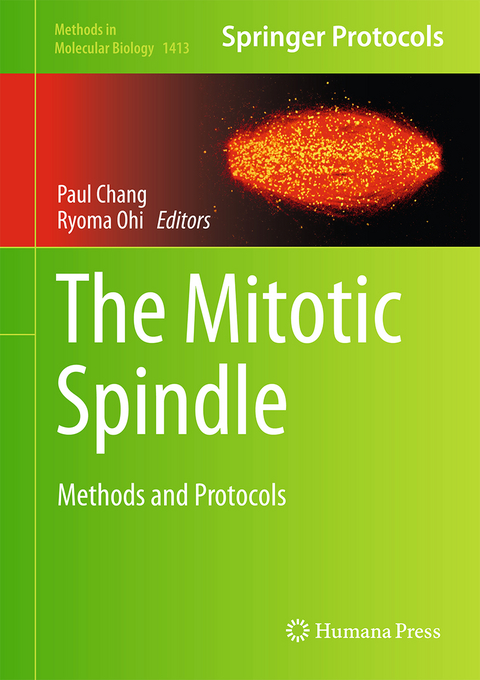
The Mitotic Spindle
Humana Press Inc. (Verlag)
978-1-4939-3540-6 (ISBN)
protocols focused on mitotic spindle assembly and function. The methods covered
in this book feature a broad range of techniques from basic microscopy to the
study of spindle physiologies relevant to cancer. These methods can be applied
to diverse model systems that range from the cell-free Xenopus egg
extract system to the moss Physcomitrella patens, in an effort to
demonstrate the key contributions made by researchers using multiple model
organisms. Chapters in The Mitotic Spindle: Methods and Protocols integrate cutting-edge technologies that have only become available due to the
cross-disciplinary efforts, such as ATP analogue sensitive inhibition of
mitotic kinases. Written in the highly successful Methods in Molecular Biology
series format, chapters include introductions to their respective topics,
lists of the necessary materials and reagents, step-by-step, readily
reproducible laboratory protocols, and tips ontroubleshooting and avoiding
known pitfalls.
Thorough and informative, The
Mitotic Spindle: Methods and Protocols, is a valuable resource for
researchers who are new to mitosis or are already experts in the field.
Using Fluorescence
Microscopy to Study Mitosis.- Using Photoactivatable
GFP to Study Microtubule Dynamics and Chromosome Segregation.- Purification and Fluorescent Labeling
of Tubulin from Xenopus Laevis Egg Extracts.- Measuring
the Effects of Microtubule-Associated Proteins on Microtubule Dynamics In Vitro.- Imaging
and Quantifying the Dynamics of γ-Tubulin at Microtubule Minus Ends in Mitotic Spindles.- Visualizing and Analyzing Branching Microtubule Nucleation Using Meiotic Xenopus Egg Extracts and TIRF Microscopy.- Encapsulation
of Xenopus Egg and Embryo Extract Spindle
Assembly Reactions in Synthetic Cell-Like Compartments
with Tunable Size.- In Vitro Kinetochore Assembly.- Biochemical
and Structural Analysis of Kinetochore Histone-Fold Complexes.- Measuring Kinetochore-Microtubule Attachment Stability in Cultured Cells.- Studying
Kinetochores In Vivo Using FLIM-FRET.- Purification of Fluorescently Labeled
Saccharomyces Cerevisiae Spindle Pole
Bodies.- A Cell-Free
System for Real-Time Analyses of Centriole Disengagement and Centriole to Centrosome
Conversion.- Assays
to Study Mitotic Centrosome and Spindle Pole Assembly and Regulation.- Analyzing
Spindle Positioning Dynamics in Cultured Cells.- Quantification of Mitotic Chromosome Alignment.- Imaging Mitosis
in the Moss Physcomitrella Patens.- Small Molecule
Approach to Study the Function of Mitotic Kinesins.- Identification
and Characterization of Mitotic Spindle-Localized Transcripts.- Probing Mitosis
by Manipulating the Interactions of Mitotic Regulator Proteins Using Rapamycin-Inducible
Dimerization.- Studying
Kinetochore Kinases.- Engineering
and Functional Analysis of Mitotic Kinases through Chemical Genetics.- Using Cell
Culture Models of Centrosome Amplification to Study Centrosome Clustering in Cancer.- Generation
and Purification of Tetraploid Cells.- Anti-Microtubule
Drugs.
| Erscheinungsdatum | 08.10.2016 |
|---|---|
| Reihe/Serie | Methods in Molecular Biology ; 1413 |
| Zusatzinfo | 52 Illustrations, color; 27 Illustrations, black and white; XIII, 424 p. 79 illus., 52 illus. in color. |
| Verlagsort | Totowa, NJ |
| Sprache | englisch |
| Maße | 178 x 254 mm |
| Themenwelt | Naturwissenschaften ► Biologie ► Allgemeines / Lexika |
| Naturwissenschaften ► Biologie ► Mikrobiologie / Immunologie | |
| Naturwissenschaften ► Biologie ► Zellbiologie | |
| Naturwissenschaften ► Physik / Astronomie ► Angewandte Physik | |
| Schlagworte | cell division • cell-free Xenopus egg extracts system • core cell cycle control mechanisms • electron microscopy • Light microscopy • microtubule function • microtubule polymerization dynamics • spindle functions relevant to cancer |
| ISBN-10 | 1-4939-3540-2 / 1493935402 |
| ISBN-13 | 978-1-4939-3540-6 / 9781493935406 |
| Zustand | Neuware |
| Informationen gemäß Produktsicherheitsverordnung (GPSR) | |
| Haben Sie eine Frage zum Produkt? |
aus dem Bereich


